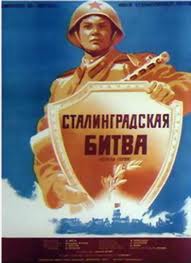The Battle of Stalingrad (1949 movie)
| The Battle of Stalingrad | |
|---|---|

A poster of the film.
|
|
| Directed by | Vladimir Petrov |
| Produced by | Nikolai Dostal |
| Screenplay by | Nikolai Virta |
| Starring | Aleksei Dikiy |
| Narrated by | Yuri Levitan |
| Music by | Aram Khachaturian |
| Cinematography | Yuri Yekelchik |
| Edited by | Klavdiya Moskvina |
|
Production
company |
|
|
Release date
|
|
|
Running time
|
192 minutes (combined)
|
| Country | Soviet Union |
| Language | Russian |
192 minutes (combined)
The Battle of Stalingrad (Russian: Сталинградская битва) is a 1949 two-part Soviet epic war film about the Battle of Stalingrad, directed by Vladimir Petrov. The script was written by Nikolai Virta.
In the Kremlin, Stalin analyzes the Wehrmacht's movements and concludes that the Germans aim to capture Stalingrad. Hitler, who believes the city is the key to final victory, orders his Generals take it at all costs.
As the enemy approaches Stalingrad, the Red Army and the local population rally to defend it in a bitter house-to-house combat, stalling the German advance. In Moscow, Stalin plans the counter-offensive.
The Wehrmacht launches a last, massive assault, intended to overwhelm the defenders of Stalingrad. As the Red Army is pushed back to the Volga, Stalin orders to commence Operation Uranus. The Germans are encircled, and efforts to relieve the Stalingrad pocket fail. Paulus, ordered by Hitler to hold to the end, refuses to surrender while his soldiers starve. The Soviets close on the city, destroying the Sixth Army. After Red Army soldiers enter his command post, Paulus orders his remaining troops to surrender. The Soviets hold a victory rally in liberated Stalingrad; In Moscow, Stalin looks at a map, setting his eyes on Berlin.
The film is the last of the 'Artistic Documentaries', a series of propaganda epics that recreated the history of the Second World War with a Stalinist interpretation of the events. Like all of the other films in the genre, The Battle of Stalingrad consists mainly of battle scenes and staff meetings, reconstructing the campaign from the point of view of the soldiers and the generals, in a heroic manner fitting the state's ideology.
The movie won the Crystal Globe in the 1949 Karlovy Vary Film Festival.Aleksei Dikiy, who portrayed Stalin, received the 1949 Gottwaldov Film Festival's prize, and director Vladimir Petrov won the Czechoslovak Workers' Film Festival Best Director Award. Petrov, cinematographer Yuri Yekelchik and four actors - Aleksei Dikiy, Nikolai Simonov, Yuri Shumski and Vladimir Gaidarov - were awarded the Stalin Prize at 1950 for their role in the film.
...
Wikipedia
